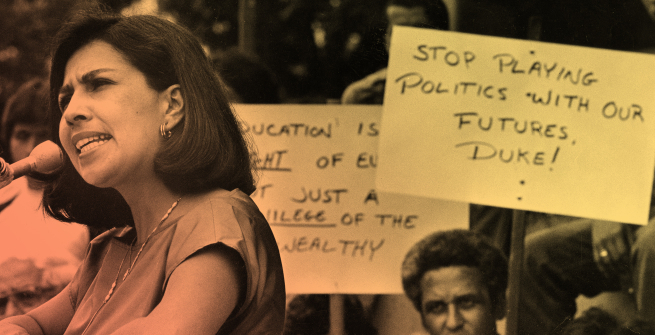Los Angeles lost a rare, truly homegrown hero of the people this week. Our beloved Gloria Molina passed on May 14th after a battle with cancer. In her iconic skirt suits, straight shoulder-length black hair parted on the side, and later with a wisp of white (and sometimes purple, her favorite color), she was as much a symbol of Los Angeles as The Dodgers and City Hall. Her name was just as familiar to Angelenos as Vin Scully or Tom Bradley, with the exception that, to Eastside and Latinx communities, she looked like our tias, sisters, or comadres.
Gloria was the oldest of 10 children to a Mexican mother and a Mexican American father. Born in Montebello, CA, and residing in Pico Rivera, her academic career started the way many other first-generation, public high school graduates start, in community college. After attending Rio Hondo College and East Los Angeles College, she transferred to Cal State LA and worked while attending the university. Her working-class upbringing and start-from-the-bottom trajectory were evident in her compassion for working folks, her cultural understanding, and her fighting for Latinx communities.
You might think that because she broke racial and gender barriers, such as becoming the first Latina elected to the California State Assembly and the Los Angeles City Council and the first woman elected to the L.A. County Board of Supervisors in one of the largest metropolitan cities in the nation, that her path was paved in privilege or nepotism when it was anything but. In an interview, her sister Bertha Molina Mejia asked her, 'Gloria, what did it feel like, the board of supervisors, all those men and you at 4 (foot) 11 (inches), walking in there?' and she said, 'It was a little nerve-racking, but I found my way."
I personally remember her name in the news in the early 1980s. She was a young state assemblywoman using her position to help Madres del Este de Los Angeles (MELA) stop a prison from being built in Boyle Heights, a proposition by then-Governor George Deukmaejian. It seemed like a daunting task, a swim against an unforgiving current for those mostly housewives of color in a disenfranchised community. I remember thinking that these fights rarely end well for the underdog. In a Los Angeles Times article, Molina said about the group, "These are not losers who say, 'Well, that's the way the system treats us.' They've learned not to be frightened or intimidated by people in power." She gave these women a voice and fought with them, ultimately winning the battle and keeping Boyle Heights free of a carceral state.
In 2019 I had the rare privilege of sitting and speaking to Gloria once in a social setting. I was nervous, star-struck, and a little tongue-tied. I mean, here is the matriarch of the People of East LA and beyond. Despite her larger-than-life accomplishments, she was relatable and funny, but I wouldn't say ordinary. The energy around her was palpably powerful...Her voice, both strong and sure, and motherly and feminine, as she talked about her daughters when I introduced her to mine. She listened to me, interested in my library work with young people. I was working on a civic engagement project at the time. She eagerly offered to give me several copies of a book that followed her political campaign to be elected to the Los Angeles City Council, exclusively for my teens. She was clearly enjoying her post-political life with friends, art, music, and good food, yet she still had a fire inside to inspire and affect lives.
In her retirement years, Gloria was able to focus more time on her passion for quilting, The East L.A. Stitchers (TELAS de la Vida), or "Las Molinistas," as some called themselves, was another "first" for her as the founder of this first-of-its-kind Latina quilt group. In a statement on Facebook, the group posted: "Gloria Molina believed in us, like a mother hen, she guided, prodded, cajoled and sometimes pushed us to improve our work. She was relentless in urging us to master our skills and generous in sharing her supplies, ideas, and designs. Her creations reflected her gifted artistic talent and her love and devotion to her culture and family history."
Some say your legacy is measured by how many lives you affect. Few people have touched the lives of Angelenos on the east side of the river quite like the woman I and many of my generation grew up with and will forever remember as the woman who "found her way."
Gloria Molina will forever be part of the fabric of Los Angeles.
Que Viva Gloria!
